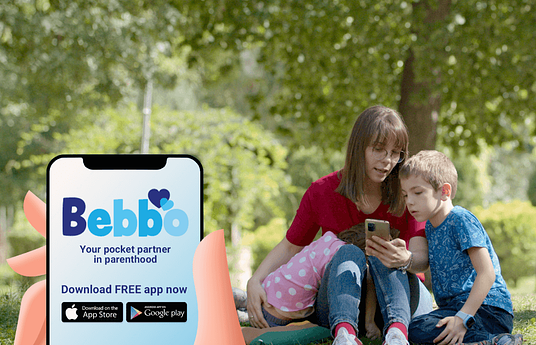This idea is reflected in the work of these three outstanding innovations selected for the HundrED Global Collection 2025. Each innovation addresses unique aspects of parent engagement, providing transformative solutions to improve educational outcomes worldwide.
Bebbo: Empowering Caregivers with Developmentally-Appropriate Tools

For many caregivers, choosing activities that are both educational and suited to their child’s developmental stage can feel overwhelming in today’s sea of options. The Bebbo Parenting App simplifies this process, offering developmentally-appropriate games and activities designed to prepare children for schooling.
In addition to its engaging resources, Bebbo provides high-quality parenting guidance and support in local languages, making it accessible to diverse communities. By equipping caregivers with these tools and knowledge, Bebbo helps parents lay the foundation for their children’s lifelong learning journey with confidence and ease.
Virtual Parent Teachers Meeting Week: Strengthening Parent-Teacher Collaboration

Fostering healthy communication and trust between parents and teachers is vital for a supportive educational ecosystem. That's why Samarthya created Virtual Parent Teachers Meeting Week to ensure that parents can engage meaningfully with their children’s learning journey, regardless of geographic or logistical barriers.
Through virtual meetings, this initiative creates opportunities for parents and teachers to share insights, address challenges, and collaborate to create a cohesive learning strategy. By bridging the communication gap, the initiative strengthens relationships and ensures that parents are active contributors to their child’s education. Through their meaningful work, they have already improved parent-teacher relations in 19000 schools in Punjab, India.
Raster Master Three Generations Learning Model: Breaking the Cycle of Illiteracy Through Intergenerational Learning

In many communities, illiteracy and poverty are perpetuated across generations. The Raster Master Three Generations Learning Model by Teacher of the Street takes a holistic approach to education by involving not just students, but also their parents and grandparents. By educating first-generation learners’ families—particularly underprivileged girls and women—Raster Master addresses critical issues such as high dropout rates, child exploitation, and gender disparities.
“When children bring knowledge home and families engage in shared learning, they build a foundation for lifelong growth, preserve cultural heritage, and foster inclusive progress”
Deep Narayan Nayak, Founder of Raster Master explains how intergenerational learning is critical to breaking cycles of poverty, “Educating first-generation learners alone is not enough to break cycles of poverty and inequality; empowering their families creates a ripple effect of transformation. When children bring knowledge home and families engage in shared learning, they build a foundation for lifelong growth, preserve cultural heritage, and foster inclusive progress that resonates across generations and societies.”
“The three generation model is a two-way street. Almost all my tribal students are first generation learners. At home, they are able to teach their parents and grandparents basic literacy and computation skills that allows them to have the street smarts to conduct day-to day-business. On the other hand, my children learn about their tribal culture and practices through folklore, and songs from their families. I strongly encourage this because I view it as a successful way to preserve indigenous culture.”
A Shared Responsibility for Lifelong Learning

These innovations underscore a powerful truth: parents are vital partners and a root for change in shaping their children’s education. Whether through accessible tools, enhanced communication, or intergenerational learning, they show how parents and educators can work together to create environments where children flourish.
Virtual PTMs emerged as a lifeline during the pandemic, bridging the gap between parents and teachers when physical meetings were impossible. They proved that strong communication isn’t limited by distance—it's about creating a space where parents and students feel heard, their voices valued, and their concerns addressed. As Mrs. Balkaran Kaur, a teacher, shared, "I got to speak to some parents who otherwise did not attend PTMs held in school. They were happy to know their child's education continued even when schools were closed." This partnership becomes even more critical in times of uncertainty, ensuring that every child’s future remains a shared priority, no matter the challenges.
Virtual PTMs emerged as a lifeline during the pandemic, bridging the gap between parents and teachers when physical meetings were impossible.
Active parental involvement doesn’t just benefit children—it uplifts entire communities, strengthening connections and fostering environments where everyone can flourish. By supporting and empowering parents, we make an investment in a brighter, more equitable future for all learners.
Find more education innovations in our Global Collection 2025.
Submit your innovation for the opportunity to be featured in the next collection.

